Lazy afternoons, a tall glass of lemonade, and a good book. The ideal combination for the perfect day. If you’re looking for just the right story to get you in the summertime mood . . . please allow me to be of service.
Happy reading!
Flip Turns By Catherine Arguelles
Thirteen-year-old Maddie just wants her classmate Lucas to leave her alone. He keeps asking her out—as if she hasn’t already said no a thousand times! Focusing on her competitive swim team, the Electric Eels, Maddie tries to ignore him, hoping he’ll stop harassing her.
But then, when someone starts sabotaging Maddie’s family-owned pool—glass on the deck, ketchup in the pool, followed by a “code brown”—Maddie worries it’s her “admirer” trying to get even. After Maddie’s parents rule the problems at the pool just harmless pranks, Maddie and her best friend, Ez, decide to investigate on their own. Could it be Lucas? And how can Maddie get him to leave her alone once and for all? The future of the Electric Eels and Maddie’s family legacy are on the line.
The Fire, The Water, and Maudie McGinn by Sally J. Pla (Out 7/11/23)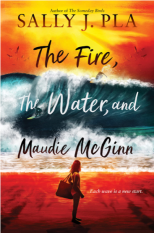
Neurodivergent Maudie is ready to spend an amazing summer with her dad, but will she find the courage to tell him a terrible secret about life with her mom and new stepdad? This contemporary novel by the award-winning author of The Someday Birds is a must-read for fans of Leslie Connor and Ali Standish.
Maudie always looks forward to the summers she spends in California with her dad. But this year, she must keep a troubling secret about her home life—one that her mom warned her never to tell. Maudie wants to confide in her dad about her stepdad’s anger, but she’s scared.
When a wildfire strikes, Maudie and her dad are forced to evacuate to the beach town where he grew up. It’s another turbulent wave of change. But now, every morning, from their camper, Maudie can see surfers bobbing in the water. She desperately wants to learn, but could she ever be brave enough?
As Maudie navigates unfamiliar waters, she makes friends—and her autism no longer feels like the big deal her mom makes it out to be. But her secret is still threatening to sink her. Will Maudie find the strength to reveal the awful truth—and maybe even find some way to stay with Dad—before summer is over?
What Lives In The Woods by Lindsay Currie
All Ginny Anderson wants from her summer is to sleep in, attend a mystery writing workshop, and spend time with her best friend. But when Ginny’s father―a respected restoration expert in Chicago―surprises the family with a month-long trip to Michigan, everything changes. They aren’t staying in a hotel like most families would. No, they’re staying in a mansion. A twenty-six room, century-old building surrounded by dense forest. Woodmoor Manor.
But unfortunately, the mansion has more problems than a little peeling wallpaper. Locals claim the surrounding woods are inhabited by mutated creatures with glowing eyes. And some say campers routinely disappear in the woods, never to be seen again.
As terrifying as it sounds, Ginny can’t shake the feeling that there’s something darker . . . another story she hasn’t been told. When the creaky floors and shadowy corners of the mansion seem to take on a life of their own, Ginny uncovers the wildest mystery of all: There’s more than one legend roaming Saugatuck, Michigan, and they definitely aren’t after campers.
It’s after her.
When Life Gives You Mangos by Kereen Getten 
Twelve-year-old Clara lives on an island that visitors call exotic. But there’s nothing exotic about it to Clara. She loves eating ripe mangos off the ground, running outside in the rain with her Papa during rainy season, and going to her secret hideout with Gaynah—even though lately she’s not acting like a best friend.
The only thing out of the ordinary for Clara is that something happened to her memory that made her forget everything that happened last summer after a hurricane hit. Sometimes things come back to her in drips like a tap that hasn’t been turned off properly. Other times her Mama fills in the blanks…only she knows those aren’t her memories and it is hard feeling like she is not like everybody else.
But this summer is going to be different for Clara. Everyone is buzzing with excitement over a new girl in the village who is not like other visitors. She is about to make big waves on the island—and give Clara a summer she won’t forget.
The First Magnificent Summer by R.L. Toalson
Twelve-year-old Victoria Reeves is all set for her “First Magnificent Summer with Dad,” even though it’s been more than two years since she last saw him. She’s ready to impress him with her wit, her maturity, and her smarts—at least until he shows up for the long road trip to Ohio with his new family, The Replacements, in tow.
But that’s not the only unpleasant surprise in store for Victoria. There are some smaller disappointments, like being forced to eat bologna even though it’s her least favorite food in the world. And then there’s having to sleep outside in a tent while The Replacements rest comfortably inside the family RV. But the worst thing Victoria grapples with is when she begins to suspect that part of the reason Dad always treats her as “less than” is for one simple reason: she’s female.
As Victoria captures every moment of her less than magnificent summer in her journal, she discovers that the odds are stacked against her in the contest-no-one-knows-is-a-contest: Not only does her wit begin to crumble around Dad’s multiple shaming jabs, but she gets her first period. And when Dad does the worst thing yet, she realizes she has a decision to make: will she let a man define her?
Camp QuiltBag by Nicole Melleby and A.J. Sass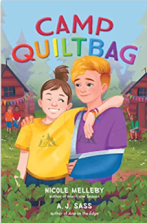
Twelve-year-old Abigail (she/her/hers) is so excited to spend her summer at Camp QUILTBAG, an inclusive retreat for queer and trans kids. She can’t wait to find a community where she can be herself—and, she hopes, admit her crush on that one hot older actress to kids who will understand.
Thirteen-year-old Kai (e/em/eir) is not as excited. E just wants to hang out with eir best friend and eir parkour team. And e definitely does not want to think about the incident that left eir arm in a sling—the incident that also made Kai’s parents determined to send em somewhere e can feel like emself.
After a bit of a rocky start at camp, Abigail and Kai make a pact: If Kai helps Abigail make new friends, Abigail will help Kai’s cabin with the all-camp competition. But as they navigate a summer full of crushes, queer identity exploration, and more, they learn what’s really important. Camp QUILTBAG is a heartfelt story full of the joy that comes from being and loving yourself.
Matteo by Michael Leali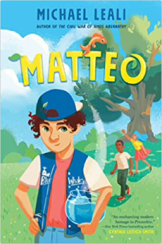
Eleven-year-old Matteo has never felt like one of the other boys. He’s sure that will change when he joins the Blue Whales, the baseball team his dad once played for. This is his chance to grow into a son his father can be proud of.
And grow Matteo does, but not the way he expected. Instead, he starts sprouting leaves and finding bark all over his skin. Alarmed, Matteo starts digging for the truth about what’s happening to him—and finds that all clues lead back to the oak tree at the center of town, which Creeksiders have always believed is a little bit magic. As his parents start noticing something is wrong, the truth gets harder to hide—and Matteo makes some surprising discoveries about himself, his hometown, and his entire family tree.
Lei And The Fire Goddess by Malia Maunakea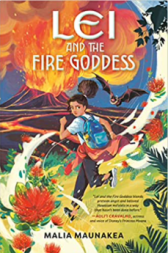
Curses aren’t real.
At least, that’s what twelve-year-old, part-Hawaiian Anna Leilani Kamaʻehu thinks when she listens to her grandmother’s folktales about sacred flowers and family guardians. Anna’s friends back home in Colorado don’t believe in legends, either. They’re more interested in science and sports—real, tangible things that stand in total contrast to Anna’s family’s embarrassing stories.
So when Anna goes back to Hawaiʻi to visit her Tūtū, she has no interest in becoming the heir to her family’s history; she’s set on having a touristy, fun vacation. But when Anna accidentally insults Pele the fire goddess by destroying her lehua blossom, a giant hawk swoops in and kidnaps her best friend, and she quickly learns just how real these moʻolelo are. In order to save her friends and family, Anna must now battle mythical creatures, team up with demigods and talking bats, and evade the traps Pele hurls her way.
For if Anna hopes to undo the curse, she will have to dig deep into her Hawaiian roots and learn to embrace all of who she is.
The Firefly Summer by Morgan Matson
For as long as Ryanna Stuart can remember, her summers have been spent with her father and his new wife. Just the three of them, structured, planned, and quiet. But this summer is different. This summer, she’s received a letter from her grandparents—grandparents neither she nor her dad have spoken to since her mom’s death—inviting her to stay with them at an old summer camp in the Poconos.
Ryanna accepts. She wants to learn about her mom. She wants to uncover the mystery of why her father hasn’t spoken to her grandparents all these years. She’s even looking forward to a quiet summer by the lake. But what she finds are relatives…so many relatives! Aunts and uncles and cousins upon cousins—a motley, rambunctious crew of kids and eccentric, unconventional adults. People who have memories of her mom from when she was Ryanna’s age, clues to her past like a treasure map. Ryanna even finds an actual, real-life treasure map!
Over the course of one unforgettable summer—filled with s’mores and swimming, adventure and fun, and even a decades-old mystery to solve—Ryanna discovers a whole new side of herself and that, sometimes, the last place you expected to be is the place where you really belong.
Forever This Summer by Leslie C. Youngblood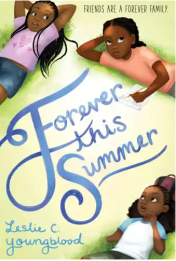
Georgie has no idea what to expect when she, Mama, and Peaches are plopped down in the middle of small town USA–aka Bogalusa, Louisiana–where Mama grew up and Great Aunt Vie needs constant care. Georgie wants to help out at the once famous family diner that served celebrities like the Jackson 5 and the Supremes, but everyone is too busy to show her the ropes and Mama is treating her like a baby, not letting her leave her sight. When she finally gets permission to leave on her own, Georgie makes friends with Markie–a foster kid who’d been under Aunt Elvie’s care–who has a limb difference and a huge attitude. Then Markie asks Georgie to help her find her mom, and suddenly summer has a real purpose. But as Georgie and Markie’s histories begin to entwine, Georgie becomes more desperate to find the truth. But words spoken cannot be taken back and once Georgie knows the truth, she may even find a way to right past wrongs and help Aunt Vie and Markie out after all.
The Summer of June by Jamie Sumner
Twelve-year-old June Delancey is kicking summer off with a bang. She shaves her head and sets two goals: she will beat her anxiety and be the lion she knows she can be, instead of the mouse everyone sees. And she and her single mama will own their power as fierce, independent females.
With the help of Homer Juarez, the poetry-citing soccer star who believes in June even when she doesn’t believe in herself, she starts a secret library garden and hatches a plan to make her dreams come true. But when her anxiety becomes too much, everything begins to fall apart. It’s going to take more than a haircut and some flowers to set things right. It’s going to take courage and friends and watermelon pie. Forget second chances. This is the summer of new beginnings.
The Sun Will Come out by Joanne Levy
Twelve-year-old Bea Gelman and her best friend Frankie are planning the BEST SUMMER EVER at Camp Shalom―a sleep-away camp. But at the last minute, Frankie bows out, leaving painfully shy Bea on her own. Just talking to strangers causes Bea to break out into ugly, blotchy hives. As if the hives weren’t bad enough, Bea gets pranked by a couple of mean girls and is betrayed by someone she thought was a new friend. Bea has had enough! She decides to spend her summer in the infirmary far away from everything that’s stressing her out. No more boys (including her crush, Jeremy), no more horrible mean girls, and no more fake friends! At the infirmary, Bea meets Harry, a boy living with a disease that’s way more intense than stress breakouts. Inspired by Harry’s strength and positive outlook, Bea decides to face her fears―in a big way. The Sun Will Come Out is a funny and heartwarming account of a shy girl’s first summer away from home, where she learns she really can do anything and that silver linings can be found just about anywhere.

 Magnolia “Maggie” Hagen is determined to be in the spotlight . . . if she can just get over her stage fright. This summer she has big plans to finally attend Camp Rising Star, the famous performing arts camp she’s been dying to go to for three summers. But on the last day of school, her parents break the news: Maggie is being shipped off to fat camp. And not just any fat camp. Camp Sylvania. It’s run by world-famous wellness influencer Sylvia Sylvania, known for her soon-to-be-patented Scarlet Diet.
Magnolia “Maggie” Hagen is determined to be in the spotlight . . . if she can just get over her stage fright. This summer she has big plans to finally attend Camp Rising Star, the famous performing arts camp she’s been dying to go to for three summers. But on the last day of school, her parents break the news: Maggie is being shipped off to fat camp. And not just any fat camp. Camp Sylvania. It’s run by world-famous wellness influencer Sylvia Sylvania, known for her soon-to-be-patented Scarlet Diet.
 Eleven-year-old Daisy Thistledown is on the run. Her mother has been keeping big, glittering secrets, and now she has vanished. Daisy knows it’s up to her to find Ma, but someone—determined to stop her from discovering the truth—hunts her through London. When Daisy flees to safety through a mysterious hidden doorway, she can barely believe her eyes. She steps out of the city and into another world, Greenwild. Bursting with magic and full of amazing natural wonders, it’s almost too astonishing to be true. Not only is this land of green magic real, it also holds the key to finding Daisy’s mother.
Eleven-year-old Daisy Thistledown is on the run. Her mother has been keeping big, glittering secrets, and now she has vanished. Daisy knows it’s up to her to find Ma, but someone—determined to stop her from discovering the truth—hunts her through London. When Daisy flees to safety through a mysterious hidden doorway, she can barely believe her eyes. She steps out of the city and into another world, Greenwild. Bursting with magic and full of amazing natural wonders, it’s almost too astonishing to be true. Not only is this land of green magic real, it also holds the key to finding Daisy’s mother.
 Owen Godfrey spends his summer in Paris studying science fiction writer Jules Verne, the amazing mind behind Twenty Thousand Leagues Under the Sea and Around the World in Eighty Days. When Owen and his new friends find a dusty copy of Verne’s collected works in an old bookshop, they’re intrigued by the hidden codes written inside. As one clue leads to another, the trio gets swept into an epic treasure hunt spanning the city—from the depths of the catacombs to the top of the Eiffel Tower—by way of a skateboard, boat, car, and even a hot air balloon! But they quickly realize they’re not the only ones searching for the hidden riches. There are others who will stop at nothing to get to them first. This fast-paced larger-than-life adventure is filled with action, high stakes, and three friends dead set on cracking the Jules Verne mystery.
Owen Godfrey spends his summer in Paris studying science fiction writer Jules Verne, the amazing mind behind Twenty Thousand Leagues Under the Sea and Around the World in Eighty Days. When Owen and his new friends find a dusty copy of Verne’s collected works in an old bookshop, they’re intrigued by the hidden codes written inside. As one clue leads to another, the trio gets swept into an epic treasure hunt spanning the city—from the depths of the catacombs to the top of the Eiffel Tower—by way of a skateboard, boat, car, and even a hot air balloon! But they quickly realize they’re not the only ones searching for the hidden riches. There are others who will stop at nothing to get to them first. This fast-paced larger-than-life adventure is filled with action, high stakes, and three friends dead set on cracking the Jules Verne mystery.
 Julia didn’t always believe in aliens. It was her father who convinced her otherwise. You see—Julia’s dad believes he was abducted by aliens. And ever since then, he’s been obsessed with the extraterrestrial beings. So when a festival commemorating the 75th anniversary of the infamous UFO crash in New Mexico rolls around, Julia turns down a dream vacation to Hawaii with her best friend, Sara, to join her dad for a weekend trip to Roswell, where he expects the aliens to make contact.
Julia didn’t always believe in aliens. It was her father who convinced her otherwise. You see—Julia’s dad believes he was abducted by aliens. And ever since then, he’s been obsessed with the extraterrestrial beings. So when a festival commemorating the 75th anniversary of the infamous UFO crash in New Mexico rolls around, Julia turns down a dream vacation to Hawaii with her best friend, Sara, to join her dad for a weekend trip to Roswell, where he expects the aliens to make contact. knows her odds of being born were one in 5.5 trillion, and that the odds of her having the best family ever were even lower. Yet somehow, Kemi lucked out. But everything she thought she knew changes when she sees an asteroid in the sky, casting a purple haze over her world. Amplus-68 has an 84.7% chance of colliding with Earth in four days, and if that happens, Kemi’s life as she knows it will end.
knows her odds of being born were one in 5.5 trillion, and that the odds of her having the best family ever were even lower. Yet somehow, Kemi lucked out. But everything she thought she knew changes when she sees an asteroid in the sky, casting a purple haze over her world. Amplus-68 has an 84.7% chance of colliding with Earth in four days, and if that happens, Kemi’s life as she knows it will end. Scholastica, or “Tick,” has grown up helping her father make candles in his shop. The experience has its ups and downs. Constantly smelling like tallow makes it hard for Tick to keep friends, but stray cats love her. Still, she delights in the work and the fact she can help Papa. Every summer, they use the long daylight hours to make as many candles as possible to sell at the Stourbridge Fair, the highlight of their year. And this year Tick will make the special Agnus Dei charms that keep travelers safe.
Scholastica, or “Tick,” has grown up helping her father make candles in his shop. The experience has its ups and downs. Constantly smelling like tallow makes it hard for Tick to keep friends, but stray cats love her. Still, she delights in the work and the fact she can help Papa. Every summer, they use the long daylight hours to make as many candles as possible to sell at the Stourbridge Fair, the highlight of their year. And this year Tick will make the special Agnus Dei charms that keep travelers safe.
 Oscar Buckle lives in a city where it’s always raining. And when it isn’t raining, it’s about to rain, so the townspeople have learned to embrace it. Oscar’s father is an umbrella maker—appropriate for a place where you can’t leave home without one!—but while Buckle Umbrellas are strong, reliable, and high quality, they’re expensive. Because of this, people are buying from the competitor instead, which is threatening Oscar’s family’s business.
Oscar Buckle lives in a city where it’s always raining. And when it isn’t raining, it’s about to rain, so the townspeople have learned to embrace it. Oscar’s father is an umbrella maker—appropriate for a place where you can’t leave home without one!—but while Buckle Umbrellas are strong, reliable, and high quality, they’re expensive. Because of this, people are buying from the competitor instead, which is threatening Oscar’s family’s business. relief—but she knows her parents would be outraged. They’re survivalists who raised her to be independent and only enrolled her in middle school to show her why they’ve decided to opt out of society. Still, Gerty is determined to protect her beloved Pando, a nearby ancient aspen forest.
relief—but she knows her parents would be outraged. They’re survivalists who raised her to be independent and only enrolled her in middle school to show her why they’ve decided to opt out of society. Still, Gerty is determined to protect her beloved Pando, a nearby ancient aspen forest.